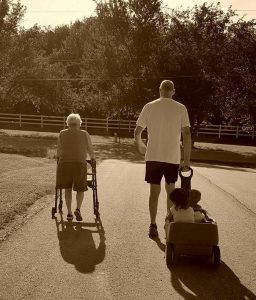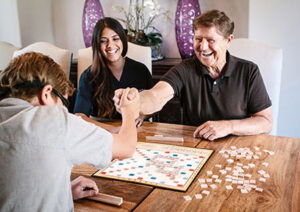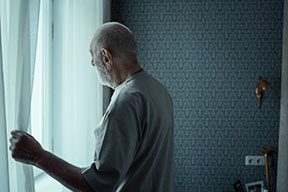Whoever you have in place to provide in-home care for you or your senior loved one, and whatever relationship you share, you benefit from the one truth that withstands the test of age and time: We have prospered under the care of others since the day we were born.
Trace your experience with quality care to your childhood when parents or guardians looked over your every need. Look at the friendships, mentorships, romantic relationships and companions in your life and remember how these special people put in care that helped create the person you are today. If you have entered your golden years, observe who are the frontline heroes championing your well-being. Is it your spouse? Is it your child? Is it your Amada caregiver?

Let us take care of the children, for they have a long way to go.
Let us take care of the elders, for they have come a long way.
Let us take care of those in between, for they are doing the work.
— African prayer
The compassionate and caring people who assume the role of essential workers in our aging lives can make an extreme impact. The positive emotional impact of quality care is one thing that keeps members of our elderly population healthy, happy and safe. In addition, assurance of the simple fact that our senior loved ones are being cared for can have a positive emotional impact on our families as well. If you are a senior citizen who is a recipient of in-home care, you may know these things very well. If you are the loved one of a senior, you may not know about them yet.
Think about the professional caregiver who has entered your life at the request of you or your loved ones, or at the order of a physician. Trained and knowledgeable Amada Senior Care caregivers are paired with senior clients with the purpose of ensuring their health and well-being. They are responsible for assisting you or your elderly loved one and understanding how to facilitate senior independent living as much as possible.
Professional care providers like those serving at Amada franchise offices have the knowledge and experience to remember details that seniors depend on, such as knowing the right time for medication, medical visit schedules, diet restrictions and how to cook for them. Besides providing care services for everyday needs or activities of daily living (ADLs), they dedicate their minds and bodies towards serving seniors in a way that no other health professional can.
Caregivers make a profession of not only doing these things for seniors but of caring about seniors personally as well. Still, it takes genuine selflessness and a resolve to prioritize someone else’s personal care needs— toilet, bathe, groom, feed, dress, ambulate, etc.—above everything else. The concern expressed for the seniors they care for is the motivating fuel for all the caregiving services they perform. Seniors receiving in-home care often are extremely grateful for this and can feel immense emotional security knowing their basic needs are taken care of.
One very important emotional benefit a senior receives from their caregiver is companionship. Social isolation is a devastating problem seniors frequently endure, especially if they do not have family nearby. The necessity of minimizing risks during COVID-19 has increased feelings of loneliness among homebound seniors. With a caregiver, seniors have someone to see and talk to regularly. This kind of social interaction has multiple health benefits and emotionally, it is effective in reducing mental health issues such as depression. A caregiver has the potential to become your elderly loved one’s best friend.
There are both positive and negative emotional impacts of quality care on a caregiver. The situation changes whether your caregiver is hired through a highly ranked agency like Amada Senior Care or if they are your loved one, and statistics show that caregivers tend to be a senior’s spouse or daughter. This informal care can culturally be the norm, particularly for diverse American families that embrace filial piety, or the tradition of caring for elders within the family. Also, when family members are the closest and most trusted people who have the access to a senior in need, they are frequently turned to for the task of managing a senior’s care.
Informal caregivers devote a large amount of time and energy to care, which can take up to 24 hours in a day. They find little time for themselves, which means less privacy and leisure. Caregiving can increase expenses and reduce income, especially if the loved one has to sacrifice a daily job to provide care at home. These factors can lead to worsened mood and perception of a decrease in quality of life.
This negative emotional impact of caregiving on family members can create a cloud of burden in the home of a senior in need. It can strain family relationships that had not included aspects of caregiving in the past. Some family relationships might experience extreme discomfort if children are transitioned into a “parental” role for own their parents. Sandwich generation caregivers are also under pressure to provide for their families in addition to aging family members.
The informal caregivers who endure all of this can only maintain their drive by remembering the emotional rewards of caring for their loved one. Selflessness fulfills generosity reserves in all sorts of people and makes them feel meaning in the work they do for others. With a purpose to nurture someone else, people find a calling larger than themselves. They devote the strengths of their character towards this cause. Even under extremes of negative emotional impact, caregivers will perform duties for their loved ones nonetheless, pulled by the dependence of another and pushed by their own will to protect and nurture.
Caregiving can bring out the best in any of us, yet it has emotional costs if the tasks come upon you unexpectedly. Knowing the emotional impact of quality care can help you be better able to make decisions about what kind of person should provide it for you or a senior loved one.
If you are the best caregiver for your senior loved one, know that you have a positive, uplifting emotional impact on them. Also know that caregiving has an emotional impact on you. If this impact costs you more than you wish, you may need help. Caregiving is a taxing, yet essential and at times rewarding job. However, you are only the best caregiver you can be if you have been taken care of yourself. That means if someone else has to step in to relieve you of caregiving duties, you can help yourself with the assurance that a qualified and trained Amada caregiver helps your senior loved one as well.
“The Emotional Impact of Quality Care,” written by Michelle Mendoza and updated by Michelle Flores, Amada blog contributors. Photo provided by Mell and Mike Fleming, owners of Amada Senior Care of Johnson County (KS).















